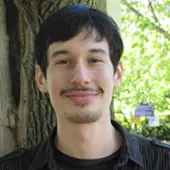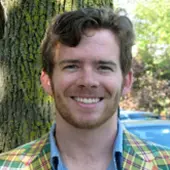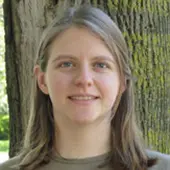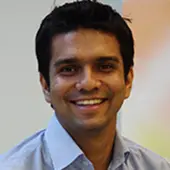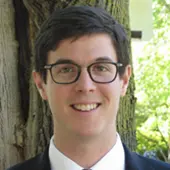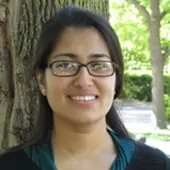2012-2013 Cluster Fellows
Jason R. Avila
Department/Program: Chemistry
Faculty Advisors: Joseph T. Hupp, Charles E. and Emma H. Morrison Professor of Chemistry
Status of Studies: Completed PhD in Chemistry
What is your area of focus at Northwestern?
During my Ph.D. the focus of my research was the development of new material architectures for high performance electrochemical supercapacitors using Atomic Layer Deposition (ALD). ALD is a technique allowing for angstrom scale growth of a variety of materials including transition metal oxides. Using this technique, I intend to grow high aspect ratio nano clusters using spatially isolated nucleation sites in Metal-Organic Frameworks
Brief personal history:
I was born and raised In Los Angeles, California. I graduate Magna Cum Laude at the University of California, Los Angeles where I majored in Chemistry. It was at UCLA where I grew interested in energy focused research while working in Prof. Sarah Tolbert’s lab where I made surface grafted polymer electrolyte for use in solid-state 3-D nanobattery arrays. During the last year I was at UCLA I participated in the California Nano-System Institute high school outreach program, where I assisted in teaching public high school science teachers from the Los Angeles area how to run simple yet state-of-the-art nano-science experiments in their classrooms in an effort to promote an interest in science amongst young adults in Los Angeles. I was drawn to Northwestern for the myriad of research groups that tackle the energy problem from many directions. I started my graduate career researching dye-sensitized solar cells in Joe Hupp’s lab and later shifted my research interest toward developing catalyst that mimic enzymatic systems for the conversion of water or carbon dioxide to fuels.
Why were you interested in becoming a Cluster Fellow?
I became interested in becoming a Cluster Fellow to meet people of varying academic/professional backgrounds and discuss how others wish to improve our energy infrastructure. Upon receiving my Ph.D I intend to continuing pursuing research in renewable energy sources and energy storage and feel a firm understanding of the many routes toward better energy policy will only benefit my future career endeavors.
The highlights of this year’s experience were:
During my year as a Cluster Fellow I had the pleasure to become significantly acquainted with both the concerns regarding sustainability but also the difficult, and yet rewarding, process of creating a startup company. During that time I also received a guest graduate appointment at Argonne national labs, the work of which is soon to be published.
This experience has enriched my time here at Northwestern by:
This years’ experience has given a wealth of knowledge to further motivate my work toward better technologies for a more sustainable energy infrastructure. During this time I have also been able to network with other highly motivated people, of whom I hope to collaborate in the future.
My future plans include:
I am currently working as a post-doc at Argonne National developing novel films for concentrated solar power under the mentorship of Dr. Jeffery Elam. My long term goal is to continue developing novel materials for energy applications and to obtain a permanent appointment at a DOE national lab.
Joseph Halverson
Department/Program: JD/MBA
Faculty Advisor: Fran Langewisch, Assistant Dean and Director of Student LifeStatus of Studies: Completed JD/MBA Program
What is your area of focus at Northwestern?
I am a third year joint law and MBA student, majoring in Entrepreneurship and Finance.
Brief personal history:
I graduated from the University of Texas with a degree in mechanical engineering. I then worked for four years as an environmental consultant with Trinity Consultants, an air compliance specialty firm. At Trinity Consultants, I developed expertise in state, federal, and international greenhouse gas (GHG) reporting for clients across multiple sectors. I am currently pursuing a joint law and MBA program at Northwestern. Over the past summer, I worked at Hybrid Electric Vehicles Technologies, a clean tech startup developing more efficient electric motor technology. Going forward, I'm interested in both the technology and energy sectors.
Why were you interested in becoming a Cluster Fellow?
The Cluster Fellowship brings together a diverse mix of graduate students with different perspectives for finding sustainable solutions for the future.
The highlights of this year’s experience were:
I very much enjoyed the classes that were required as part of this fellowship. It exposed me to courses outside of the typical legal and business curriculum, which I found invaluable. I also enjoyed being a teaching assistant in an introduction to sustainability course. It was inspiring to teach and help develop future leaders for the environment. As cliché as it sounds, I learned a lot from the students in the process, and I am grateful for the experience this fellowship has provided me.
This experience has enriched my time here at Northwestern by:
It challenged me to do even more in the energy and sustainability space. Through this experience, I have interacted and learned from innovative leaders in the field. This close-knit community works hard everyday to increase the awareness and visibility of sustainability issues on campus.
My future plans include:
I am currently involved in a law internship focusing on intellectual property law in Austin, Texas. I am looking to explore either a legal or consulting career after graduating from my program.
Update:
Working at Boston Consulting Group pursuing management consulting in Dallas, Texas. Past experience includes redesigning the health, environment, and safety organization within a Fortune 10 company.
Sarah Howell
Department/Program: Materials Science & Engineering
Faculty Advisor: Lincoln Lauhon,
Professor of Materials Science and Engineering; Co-Director, Applied Physics ProgramStatus of Studies: Third Year
What is your area of focus at Northwestern?
My PhD research is on characterizing the optical and electrical properties of novel nanostructured materials and devices. My past PhD research included the study of InGaN core-shell nanowire array solar cells using Scanning Photocurrent Microscopy (SPCM) to measure the photogenerated current extracted from these devices as a function of illumination position and of illumination wavelength. An understanding of what causes performance variations can be used to improve the efficiency of devices made using this innovative nanowire structure. My current research includes the fabrication and characterization of novel 2D heterojunctions with MoS2 (a layered ultrathin semiconductor complementary to graphene and boron nitride). I investigate the nature of these heterojunctions by coupling spatially and spectrally resolved measurements with optical and electrical simulations of these nanostructured electronic devices.
Brief personal history:
I was raised in Oklahoma City as the youngest of nine siblings. I moved to Southern California and graduated from Caltech with Honors in Applied Physics in 2011. As an undergrad I was motivated to pursue a number of research projects for alternative energy technologies. I have since moved to Chicago to earn a PhD in materials science.
Why were you interested in becoming a Cluster Fellow?
Through this Cluster Fellowship I hope to gain a broader understanding of how I can help combat energy and climate change problems.
Nishit Mehta
Department/Program: MBA
Faculty Advisor: Michael Marasco, former Founding Director, Farley Center for Entrepreneurship and Innovation
Status of Studies: Completed MBA Program
What is your area of focus at Northwestern?
Nishit Mehta graduated with an MBA from the Kellogg School Management, where he majored in Finance, Strategy, and Entrepreneurship. He is currently working at Exelon as Principal, Business Strategy of the Emerging Tech team. He also heads the internal entrepreneurship program at Exelon. Mehta co-founded and was previously the VP of Business Development at Sinode Systems, and advanced Li-ion battery technology company.
Brief personal history:
Nishit is the Director of the Kellogg Energy Club and is focused on increasing global partnerships for all energy initiatives at Northwestern. Most recently before Kellogg, Nishit helped setup the Solar Photovoltaics business for Siemens in India. Here he led the sales, marketing and business development efforts, and spearheaded business process formation for the new business unit. Prior to this Nishit was Siemens' Key Account Manager for a key energy equipment supplier in India. There he worked on customer relationship management, business acquisition and channel management. Going forward, Nishit is interested in the cleantech startup and early-stage investment space.
Why were you interested in becoming a Cluster Fellow?
- To increase communication and collaboration between various Energy organizations within Northwestern.
- To leverage my past experience in the Energy Industry for the benefit of Northwestern Students interested in the sector
- To network with like-minded peers
Update:
I left Exelon to move to India where I joined Sterlite Power as V.P. - Energy Storage. In this role I am building a new business for Sterlite as a developer of utility-scale energy storage systems. I am also exploring new business opportunities for Sterlite in the dynamically evolving Electric Vehicle space.
Status of Studies: Fourth Year
What is your area of focus at Northwestern?
As a student in the Wolverton Research Group, I study materials for energy storage applications. I use atom-scale computer simulations to synthesize and test materials virtually. This computational approach accelerates materials design and speeds emerging technologies to market. I am currently studying electrode materials for Li-ion batteries. Electrode materials must be made more durable to withstand higher battery voltages, and this is being accomplished with core/shell electrode particles. I study chemical equilibrium and defect concentrations in core/shell electrode materials. I have the great privilege of working with the DOE Center for Electrical Energy Storage, which is the world leader for high-capacity Li-ion battery research.
Brief personal history:
I grew up in Rhode Island near beautiful Sachuest Beach, where I worked as a lifeguard during summers. As an undergraduate at Wesleyan University, I studied Chemistry and Biophysics, and I learned how to model systems of atoms. At Wesleyan, I also played drums in a band called Red Wire Black Wire; we recorded two albums and performed in dozens of cities, including Moscow. After finishing college, I wanted to work in renewable energy so I switched fields to Materials Science and came to Northwestern for my graduate studies. At Northwestern, I currently serve as Co-Director of the Northwestern Energy and Sustainability Consortium (NESC) and President of the Northwestern Energy Technology Group (NETG).
Why were you interested in becoming a Cluster Fellow?
I feel passionately that decarbonization is mandatory to protect water resources, food security, political stability, and biodiversity around the world. Maintaining our current dependence on fossil fuels would do irreparable damage to our planet and would be a disaster for global prosperity. New innovative approaches are needed to make renewable energy affordable across all sectors. This innovation must bridge basic science research, breakthrough technologies, and the world market. The Institute is a thriving community of smart and passionate people who share this vision of sustainability, and I want to build a strong network to make this vision a reality.
Updates:
David continues his research in Li-ion cathode materials, modeling all three commercial materials - phosphate, spinel, and layered. He serves as Co-Director of the student-run Northwestern Energy & Sustainability Consortium (NESC), which he co-founded in 2011. NESC now offers two student-run seminar series, "Business of Energy" and "Technology of Energy". These series are offered each quarter with weekly seminars, are open to all Northwestern students through an application process, and cover topics including solar, wind, energy storage, grid, oil & gas, transportation, efficiency, markets, finance, Northwestern research, and more. David is the founder and CEO of Lilac Solutions, a lithium extraction company based in Oakland, California. Lilac provides technology to lithium projects unlocking new supplies for the battery industry, and is recruiting engineers with background in chem-e, mech-e, and materials.
Mona Shrestha
Department/Program: Chemistry
Faculty Advisor: Franz Geiger,
Charles E. and Emma H. Morrison Professor of Chemistry; International Institute for Nanotechnology; Director, Graduate Curriculum; Senior Editor, The Journal of Physical Chemistry (American Chemical Society)What is your area of focus at Northwestern?
I am studying the surface composition of atmospheric aerosol particles collected in São Paulo using vibrational spectroscopy. The emphasis on São Paulo is important because it is the only place in the world where the price of gasoline is held fixed while that of market-controlled ethanol has been varying, leading to the large-scale (approximately 1.4 million out of 6 million light duty vehicles) switching of fuel use by consumers depending upon fuel price.
Brief personal history:
I am originally from Kathmandu, Nepal and I came to U.S. for my undergraduate degree. I graduated from Wesleyan College in Macon, GA with a double major in Environmental Science and Chemistry. Before entering the PhD program at Northwestern University, I interned at Clemson University and University of Minnesota-Twin Cities. Apart from research, I love to travel to new places as well as spend time with family and friends.
Why were you interested in becoming a Cluster Fellow?
I was encouraged to become a Cluster Fellow because my current project deals with the impact of renewable energy and I have always been inclined towards learning more about sustainability and energy.
Publications:
Shrestha, M.; Zhang, Y.; Ebben, C. J.; Martin, S. T; Geiger, F. M. Vibrational Sum Frequency Generation Spectroscopy of Secondary Organic Material Produced by Condensational Growth from α-Pinene Ozonolysis. J. Phys. Chem. A. 2013 (in press).
